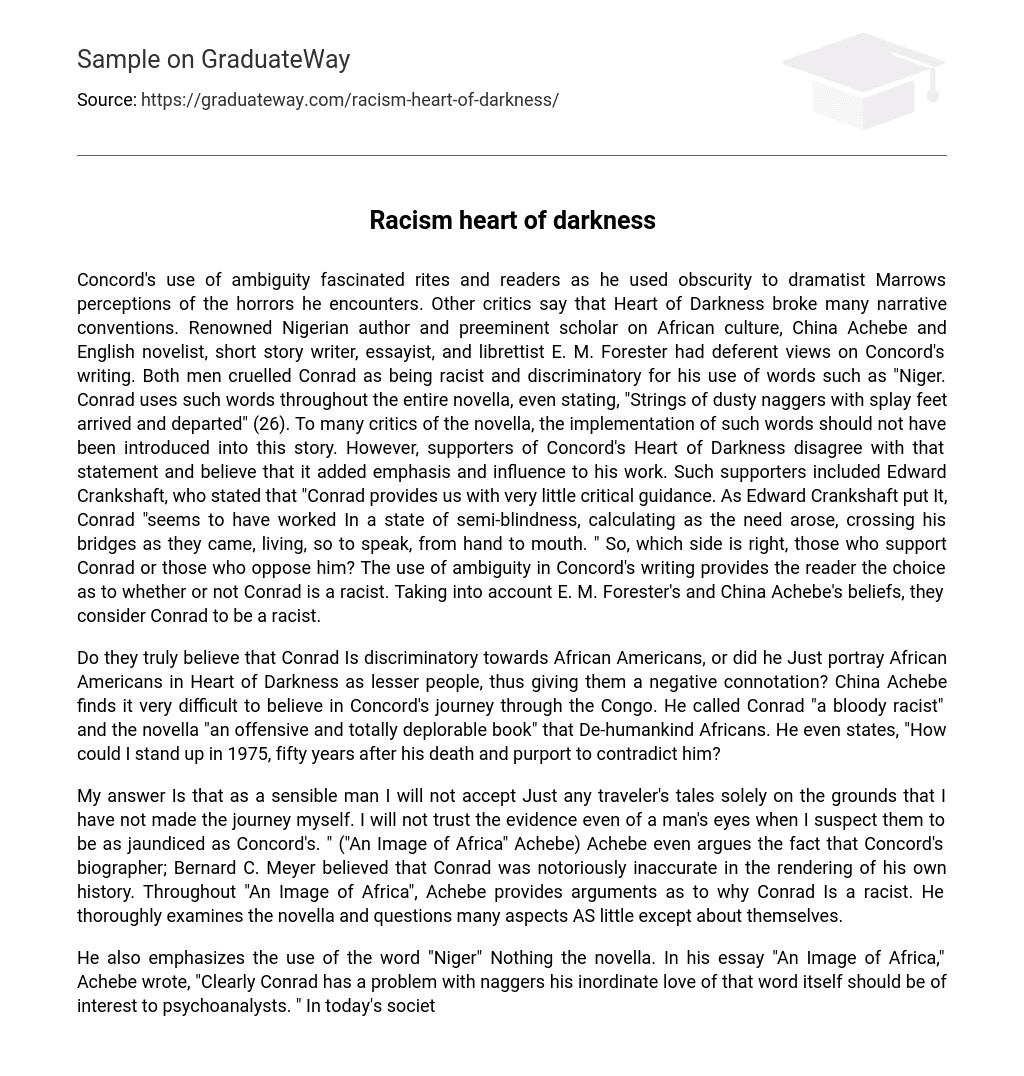Concord’s use of ambiguity fascinated rites and readers as he used obscurity to dramatist Marrows perceptions of the horrors he encounters. Other critics say that Heart of Darkness broke many narrative conventions. Renowned Nigerian author and preeminent scholar on African culture, China Achebe and English novelist, short story writer, essayist, and librettist E. M. Forester had deferent views on Concord’s writing. Both men cruelled Conrad as being racist and discriminatory for his use of words such as “Niger. Conrad uses such words throughout the entire novella, even stating, “Strings of dusty naggers with splay feet arrived and departed” (26). To many critics of the novella, the implementation of such words should not have been introduced into this story. However, supporters of Concord’s Heart of Darkness disagree with that statement and believe that it added emphasis and influence to his work. Such supporters included Edward Crankshaft, who stated that “Conrad provides us with very little critical guidance. As Edward Crankshaft put It, Conrad “seems to have worked In a state of semi-blindness, calculating as the need arose, crossing his bridges as they came, living, so to speak, from hand to mouth. ” So, which side is right, those who support Conrad or those who oppose him? The use of ambiguity in Concord’s writing provides the reader the choice as to whether or not Conrad is a racist. Taking into account E. M. Forester’s and China Achebe’s beliefs, they consider Conrad to be a racist.
Do they truly believe that Conrad Is discriminatory towards African Americans, or did he Just portray African Americans in Heart of Darkness as lesser people, thus giving them a negative connotation? China Achebe finds it very difficult to believe in Concord’s journey through the Congo. He called Conrad “a bloody racist” and the novella “an offensive and totally deplorable book” that De-humankind Africans. He even states, “How could I stand up in 1975, fifty years after his death and purport to contradict him?
My answer Is that as a sensible man I will not accept Just any traveler’s tales solely on the grounds that I have not made the journey myself. I will not trust the evidence even of a man’s eyes when I suspect them to be as jaundiced as Concord’s. ” (“An Image of Africa” Achebe) Achebe even argues the fact that Concord’s biographer; Bernard C. Meyer believed that Conrad was notoriously inaccurate in the rendering of his own history. Throughout “An Image of Africa”, Achebe provides arguments as to why Conrad Is a racist. He thoroughly examines the novella and questions many aspects AS little except about themselves.
He also emphasizes the use of the word “Niger” Nothing the novella. In his essay “An Image of Africa,” Achebe wrote, “Clearly Conrad has a problem with naggers his inordinate love of that word itself should be of interest to psychoanalysts. ” In today’s society, one who uses the “n” word is most definitely considered to be a racist and discriminatory towards African Americans. Although Achebe strongly disagrees with the use of the word “Niger” in the novella, he ultimately disagreed with Concord’s image of Africa. “Conrad did not originate the mage of Africa which we find in his book.
It was and is the dominant image of Africa n the Western imagination and Conrad merely brought the peculiar gifts of his own mind to bear on it. ” (“An Image of Africa” Achebe) Achebe’s intent on writing “An Image of Africa” was to analyze and criticize Concord’s Heart of Darkness and his style of writing, which was very unique in his time. Others critics such as E. M. Forester and F. R. Leaves considered Conrad to be part of a “great generation” of writers, but referred to Heart of Darkness as a “minor work” and criticized its “adjectival Insistence upon inexpressible and incomprehensible mystery”.
Through the statements made by these three critics, it is recognizable that they could believe Conrad was a racist, but they could also agree with the fact that Conrad was portraying his characters as racists, not himself. Although there were many critics of Heart of Darkness, there were those who supported Conrad and his style of writing as Nell. Focusing on the opposing side of the argument, most readers and interpreters of Heart of Darkness disagree with the beliefs of Achebe, Forester, and Leaves, tending to believe he is not a racist. Why do many people support Concord’s style of writing, Including Edward Crankshaft and Cedi Watts?
In 1983, Cedi Watts published an essay criticizing Achebe’s “cool, mocking, sarcastic, and angry” approach towards the subject. Watts also expressed indignation at what he considered to be an implication by Achebe, which only black people could accurately analyze and assess the novella. Gnats’ essay entitled ‘A Bloody Racist’: About Achebe’s View of Conrad attempts to defend Concord’s tale which Watts has long regarded as one of the greatest works of fiction. Watts strongly disagrees with Achebe’s criticizing of the novella, thus criticizing Achebe’s work Things Fall Apart as “a Heart of Darkness from the other side. ”





